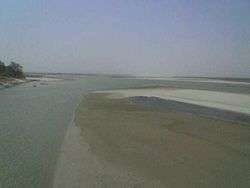Sarayu
| Sarayu | |
|---|---|
 | |
| Other name(s) | Kali River, Sarda River |
| Main source | Himalayas |
| Source elevation | 4150 meters |
| River mouth | Tributary of Ganges |
| Size | Eastern Kumaon - Western Nepal |
| Physiognomy | |
| Length | 350 Kilometers |
The Sarayu (also Sarju; Dev. सरयु saráyu- f., later Dev. सरयू sarayū-) is a river that flows through the Indian states of Uttarakhand and Uttar Pradesh. This river is of ancient significance, finding mentions in the Vedas and the Ramayana. The Sarayu forms at the confluence of the Karnali (or Ghaghara) and Mahakali (or Sharda) in Bahraich District. The Mahakali or Sharda forms the Indian-Nepalese border. Ayodhya is situated on the banks of river Sarayu. Some mapmakers[1] consider the Sarayu to be just a section of the lower Ghaghara River.
On Ram Navami, the festival that celebrates the birthday of Lord Rama, thousands of people take a dip in the Sarayu River at Ayodhya.[2]
Etymology
_Ayodhya_Ram_Paidi_Uttar_Pradesh_India_2013.jpg)
The name is the feminine derivative of the Sanskrit root सर् sar "to flow"; as a masculine stem, saráyu- means "air, wind", i.e. "that which is streaming".
Origin and course
The Sarayu forms at the confluence of the Karnali (or Ghaghara) and Mahakali (or Sharda) in Bahraich District at 27°40′27″N 81°16′39″E / 27.67417°N 81.27750°E. It flows into the Ganges at 25°44′36″N 84°40′01″E / 25.74333°N 84.66694°E.
Significance
Traditional
The river is mentioned three times in the Rigveda. The banks of the Sarayu are the location of the slaying of two Aryas at the hands of Indra in RV 4.30.18. It is listed together with western tributaries to the Indus: Rasā, Anitabha, Kubha, Krumu, and the Sindhu itself as obstacles crossed by the Maruts in RV 5.53.9. In this verse, Purisini appears as its epithet. At this stage of the earlier Rigveda, it apparently was a river west of the Indus system that corresponds to Iranian Harayu (Avestan acc. Harōiium, Old Persian Haraiva, modern Harē or Harī), the Hari River. It is invoked together with Sindhu and Sarasvati (two of the most prominent Rigvedic rivers) in the late hymn RV 10.64.
Later on, according to Ramayana 1.5.6, the Sarayu flowed beside the ancient city of Ayodhya, which is in the modern day Uttar Pradesh. It was a tributary of the Gogra. This Sarayu played a vital role for the city and life of Ayodhya, and according to the great Sanskrit epic Ramayana, is where Rama, the seventh Avatar of Vishnu immersed himself to return to his eternal, real Mahavishnu form, when he retired from the throne of Kosala. His brothers Bharata and Shatrughna also joined him, as did many devoted followers. The Sarayu is also the river upon whose banks King Rama was born.
According to a sub-story within the Ramayana, the banks of the River Sarayu is also the place where King Dashratha accidentally killed Shravan Kumar.
It is also called the only river flowing beneath the earth.
In ancient times Aciravati was one of the tributaries of the Sarayu.[3]
Modern
While the Sarayu river plays an important role in RigVeda and Atharva Veda along with Ramayana. Ayodhya, capital of King Rama is mentioned on the banks of Sarayu river. Sarayu river is mentioned in great details in Ramayana. Ayodhya still exists on the banks of river Sarayu in Indian state of Uttar Pradesh. It is a tributary of the Ganges which meets two other rivers at the confluence (sangam) in Uttar Pradesh.
In fiction
Sarayu is also the name of the river that flows by the fictional town of Malgudi created by the Indian writer R. K. Narayan.
Sarayu is the name given to the personification of the Holy Spirit in "The Shack" created by American Novelist William P. Young.
See also
Notes
- ↑ "Plate 30: India, Plains : Nepal : Mt. Everest". The Times Atlas of the World (seventh ed.). Edinburgh: John Bartholomew & Sons, Ltd. and Times Books, Ltd. ISBN 978-0-8129-1298-2.
- ↑ At Ayodhya, Ram Navami celebrated amid religious harmony Indian Express, April 15, 2008.
- ↑ Kapoor, Subodh. Encyclopaedia of Ancient Indian Geography. p. 5 (Google books). Retrieved 2010-08-18.
References
- The Ramayana, by Ramesh Menon (2001)
External links
| Wikimedia Commons has media related to Sarayu River. |
| ||||||||||||||||||||||||||||||||||||||||
| ||||||||||||||||||
| ||||||||||||||||||||||||||||||||
| ||||||||||||||||||||||
| ||||||||||
Coordinates: 27°21′N 81°23′E / 27.350°N 81.383°E

.jpg)